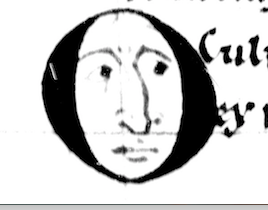 Cambridge, Clare College MS 12, fol. 89r
Cambridge, Clare College MS 12, fol. 89r
The heart of the Medical World of Master Bartholomaeus project is the production of editions and translations of the medieval writings of Bartholomaeus himself. These writings comprise:
1. commentaries on the six texts which composed the anthology that came to be known as the Articella, namely:
- the Isagoge or Introduction of "Joannitius" (i.e. Abū Zayd Ḥunayn ibn ’Isḥāq al-‘Ibādī, c 809-873, the Nestorian physician, translator and scholar active in the Abbasid court of Baghdad);
- Hippocrates' Aphorisms and Prognosis;
- the De urinis (On Urines) of the 7th century Byzantine writer Theophilus Protospatharius;
- the De pulsibus (On Pulses) of his compatriot Philaretus (9th c.?);
- and Galen's Tegni, i.e. Téchnē iatrikē or Art of medicine.
Bartholomaeus is the first named author of a full suite of commentaries on the Articella, and possibly the first to include Galen's work in the anthology;
2. a manual of therapeutics, known as Practica;
3. a letter of medicalized life-style advice (regimen) addressed to King Louis VII of France;
4. a letter of medical advice to addressed to Abbot Peter the Venerable (d. 1156) of Cluny;
5. a commentary on the Liber graduum (Book of [Pharmacological] Degrees) ascribed to Constantine the African;
6. a treatise on urines.
With the exception of items 3-5, none of these have been the subject of critical editions (see Bibliography of Bartholomaeus' Writings), and only item 5 has been translated into a modern language. Supported by an Insight Grant from the Social Sciences and Humanities Research Council of Canada, the project team will, over the next three years, complete the edition of the all the Articella commentaries, and produce a working edition of the Practica. The Articella commentaries are destined for the "Edizione nazionale scuola medica salernitana" series published by SISMEL Edizioni del Galluzzo in Florence.
In addition, the team will be disseminating research that emerges from its editing work in the form of blog posts, articles, and conference presentations.
1. commentaries on the six texts which composed the anthology that came to be known as the Articella, namely:
- the Isagoge or Introduction of "Joannitius" (i.e. Abū Zayd Ḥunayn ibn ’Isḥāq al-‘Ibādī, c 809-873, the Nestorian physician, translator and scholar active in the Abbasid court of Baghdad);
- Hippocrates' Aphorisms and Prognosis;
- the De urinis (On Urines) of the 7th century Byzantine writer Theophilus Protospatharius;
- the De pulsibus (On Pulses) of his compatriot Philaretus (9th c.?);
- and Galen's Tegni, i.e. Téchnē iatrikē or Art of medicine.
Bartholomaeus is the first named author of a full suite of commentaries on the Articella, and possibly the first to include Galen's work in the anthology;
2. a manual of therapeutics, known as Practica;
3. a letter of medicalized life-style advice (regimen) addressed to King Louis VII of France;
4. a letter of medical advice to addressed to Abbot Peter the Venerable (d. 1156) of Cluny;
5. a commentary on the Liber graduum (Book of [Pharmacological] Degrees) ascribed to Constantine the African;
6. a treatise on urines.
With the exception of items 3-5, none of these have been the subject of critical editions (see Bibliography of Bartholomaeus' Writings), and only item 5 has been translated into a modern language. Supported by an Insight Grant from the Social Sciences and Humanities Research Council of Canada, the project team will, over the next three years, complete the edition of the all the Articella commentaries, and produce a working edition of the Practica. The Articella commentaries are destined for the "Edizione nazionale scuola medica salernitana" series published by SISMEL Edizioni del Galluzzo in Florence.
In addition, the team will be disseminating research that emerges from its editing work in the form of blog posts, articles, and conference presentations.
|
McGill University
Department of History and Classical Studies 855 Sherbrooke West Montreal, Quebec H3A 2T7 Canada |